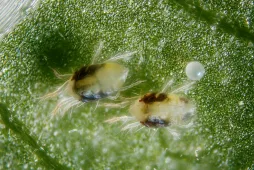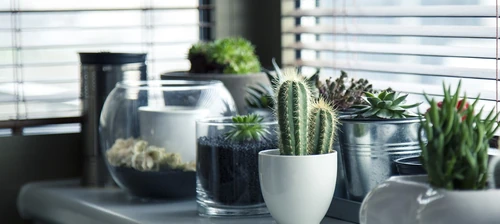Peperomia serpens, the drooping Peperomia
When we think of hanging plants, we often think of Pothos or Philodendron. But there's also a Peperomia with a drooping habit: Peperomia serpens. Better known as Peperomia scandens, this variety of the Piperaceae family comes to us from Central America.
How to recognize Peperomia serpens?
Peperomia serpens is a semi-succulent perennial. It grows to no more than 25 centimetres in height, with a 65-centimetre spread. Unlike other Peperomia, such as peperomia bean, this vine has a climbing or creeping habit. It can grow along a stake or in suspension.
The evergreen foliage resembles that of Pothos: the fleshy, glossy blades are heart-shaped. They measure no more than five centimetres. The leaves are cream-colored at birth. Their centers then turn green. In the variegated variety, the margins remain white. Not sure whether your plant is a Peperomia serpens or a Pothos? Look at the petiole. Light pink in Peperomia, green in Pothos.
Peperomia serpens is grown for its leaves. But it also flowers in summer. Spikes of white or greenish flowers bloom.
Peperomia arenon-toxic to humans and animals alike. Some scientists even claim that they have depolluting properties.
Our maintenance tips
Peperomia scandens is an undemanding tropical plant. The main thing is not to overwater it. It also appreciates light, but fears direct sunlight. Finally, it needs warmth. Never leave it in a room where the temperature falls below 13 degrees, and keep it away from draughts.
Watering
Allow the substrate to dry on the surface (at least three centimetres) between waterings. Water the root ball of your Peperomia serpens with non-calcareous water at room temperature.
Don't forget to empty any stagnant water from the dish or pot. It will rot the roots.
Spray
Spray foliage with water at room temperature. Do not use tap water. It is often too hard and leaves marks on the leaves.
Fogging temporarily increases humidity and combats the appearance of parasites.
Repotting
In spring, transfer your Peperomia serpens to a larger pot, so that it can continue to grow.
In a drilled pot, place a layer of clay balls or gravel to promote drainage. The pot should be deeper and larger than the previous one to accommodate the roots and support the growth of your peperomia scandens.
Choose a special potting soil for green plants or houseplants. After pouring in the substrate, plant your plant. Fill in with soil and tamp down to eliminate any air pockets.
Fertilization
You can stimulate the development of your plant during its growth phase, in spring and summer, with fertilizer.
To stimulate the growth of your Peperomia serpens, use a liquid fertilizer for green plants.
Cleaning
The dust that accumulates on the leaves interferes with photosynthesis and slows down your plant's development. To allow it to take advantage of the light, clean the top and bottom of the foliage with a clean, damp cloth.
Don't use any polish, as it will damage the limbs.
Prune
You can remove the yellowed leaves.
Pinch
Pinch your Peperomia serpens during its growing season.
To keep your Peperomia serpens compact, pinch a bud. You'll create new branches.
Cutting
Cutting is carried out during the strong growth phase, generally in spring and early summer.
Take a stem about ten centimeters long, including a node and at least four leaves.
In a pierced pot, pour a layer of gravel or clay balls, followed by the substrate. To promote growth, choose a rich potting soil such as horticultural compost or seedling and planting soil. You can add sand for drainage. Plant your graft and cover the roots with soil.
Place your cutting in a bright spot away from direct sunlight.
Place your cutting in a bright spot away from direct sunlight.
Disease / Threat
Information
| Family | Piperaceae - Piperaceae |
| Type | Peperomia - Peperomia |
| Species | Peperomia scandens - Peperomia serpens |
| Lifecycle | Perennial |
| Foliage | Evergreen |
| Exposures | |
| Substrat | |
| Planting method |
In pots |
| Categories | |
| Tags |
Beginner Fritillary |
| Origin |
Central America |
| Hardiness (USDA) | 11a |
| Leaf color |
|
| Flower colors |
|
Discover plants from the same family
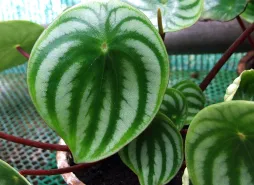
Peperomia Watermelon
Discover
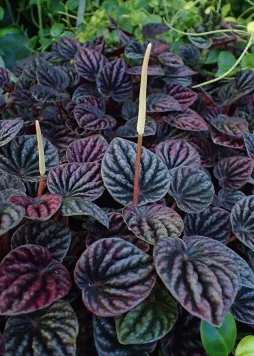
White cane
Discover
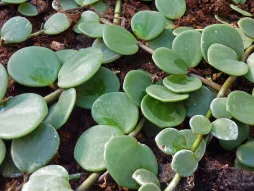
Peperomia Hope
Discover
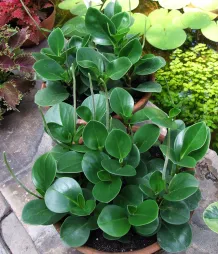
Peperomia obtusifolia
Discover














